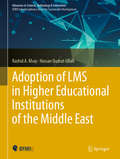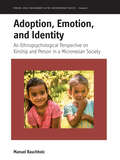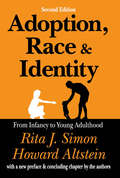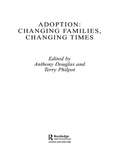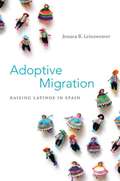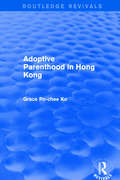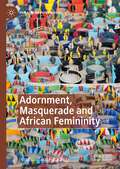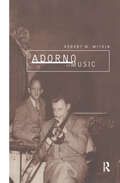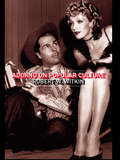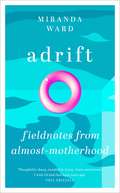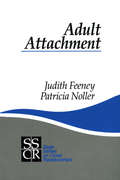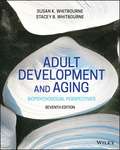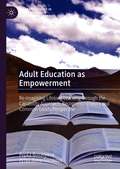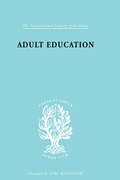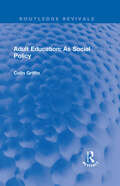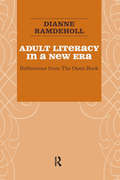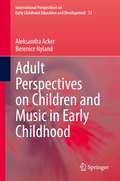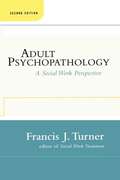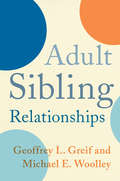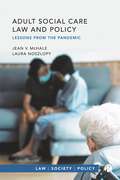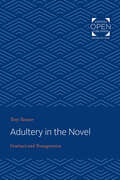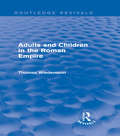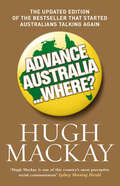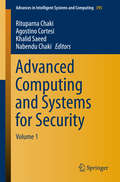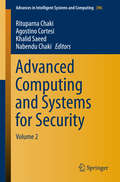- Table View
- List View
Adoption of LMS in Higher Educational Institutions of the Middle East (Advances in Science, Technology & Innovation)
by Hassan Qudrat-Ullah Rashid A. KhanThis book discusses the adoption of learning management systems (LMS) in higher education institutions. It presents influential predictors that may impact instructors’ behavioral intention to adopt learning management systems in the context of Arab culture, as well as a unique model of technology acceptance that draws on and combines previous technology adoption models (i.e., a modified unified theory of acceptance and use of technology model – UTAUT2). Moreover, this study extends the UTAUT2 model by including Hofstede’s (1980) cultural dimensions, and technology awareness as the moderators of the model. It also describes the explanatory technique approach used to collect quantitative data from the instructors at higher education institutions in Saudi Arabia and were analyzed with structural equation modeling using SPSS/Amos software. The findings revealed that facilitating conditions were the strongest predictor of behavioral intention to adopt an LMS, followed by performance expectancy and hedonic motivation, technology awareness, and cultural dimensions exerted a moderating influence on instructors’ behavioral intention to use LMS in their teaching. By including new constructs, this becomes the first study of its kind exploring instructors’ use of LMS in Higher Educational Institutions of Saudi Arabia and other countries of the Middle East. It offers practical insights for a broad range of researchers and professionals at higher education institutions and serves as a reference guide for designers of learning management systems (e.g., blackboard systems), policymakers, and the Ministry of Education staff.
Adoption, Emotion, and Identity: An Ethnopsychological Perspective on Kinship and Person in a Micronesian Society (Person, Space and Memory in the Contemporary Pacific #8)
by Manuel RauchholzExploring adoption in the Pacific, this book goes beyond the commonplace structural-functional analysis of adoption as a positive “transaction in parenthood.” It examines the effects it has on adoptees’ inner sense of self, their conflicted emotional lives, and familial relationships that are affected by a personal sense of rejection and not belonging. This account is theoretically rooted in ethnopsychology, based on field work conducted across multiple research sites in the Chuuk Lagoon, its neighboring Chuukic-speaking atolls, and persons from neighboring Micronesian island communities.
Adoption, Race, and Identity: From Infancy to Young Adulthood
by Rita SimonAdoption, Race, and Identity is a long-range study of the impact of interracial adoption on those adopted and their families. Initiated in 1972, it was continued in 1979, 1984, and 1991. Cumulatively, these four phases trace the subjects from early childhood into young adulthood. This is the only extended study of this controversial subject.Simon and Altstein provide a broad perspective of the impact of transracial adoption and include profiles of the families involved in the study. They explore and compare the experiences of both the parents and the children. They identify families whose adoption experiences were problematic and those whose experiences were positive. Finally, the study looks at the insights the experience of transracial adoption brought to the adoptive parents and what advice they would pass on to future parents adopting children from different racial backgrounds. They include the reflections of those adopted included in the 1972 first phase, who are now adults themselves.This second edition includes a new concluding chapter that updates the fourth and last phase of the study. The authors were able to locate 88 of the 96 families who participated in the 1984 study. Bringing together all four phases of this twenty-year study into one volume gives the reader a richer and deeper understanding of what the experience of transracial adoption has meant for the parents, the adoptees, and children born into the families studied. This landmark work, will be of compelling interest to social workers, policy makers, and professionals and families involved on all sides of interracial adoption.
Adoption: Changing Families, Changing Times
by Terry Philpot Anthony DouglasAdoption: Changing Families, Changing Times draws together contributions from all those with an interest in adoption: adopted people; birth parents and adoptive parents; practitioners and managers in the statutory and voluntary sectors; academics and policy makers. Chapters on research and policy are interspersed with those from people with first-hand experience of being adopted, becoming an adoptive parent or giving a child up for adoption. Together, they provide unique insights into a subject that although regularly in the media is often surrounded by prejudice and misconception. Topics covered include:* children and young people in care* trying to adopt* waiting for adoption* life after adoption* the politics of adoption.This accessible text offers a comprehensive view of adoption policy, practice and services and analyses why adoption has become so controversial. It provides professional and general reader alike with a fully rounded picture of adoption and exposes some of the myths surrounding it.
Adoptive Migration: Raising Latinos in Spain
by Jessaca B. LeinaweaverSpain has one of the highest per capita international adoption rates in the world. Internationally adopted kids are coming from many of the same countries as do the many immigrants who are radically transforming Spain's demographics. Based on interviews with adoptive families, migrant families, and adoption professionals, Jessaca B. Leinaweaver examines the experiences of Latin American children adopted into a rapidly multiculturalizing society. She focuses on Peruvian adoptees and immigrants in Madrid, but her conclusions apply more broadly, to any pairing of adoptees and migrants from the same country. Leinaweaver finds that international adoption, particularly in a context of high rates of transnational migration, is best understood as both a privileged and unusual form of migration, and a crucial and contested method of family formation. Adoptive Migration is a fascinating study of the implications for adopted children of growing up in a country that discriminates against their fellow immigrants.
Adoptive Parenthood in Hong Kong (Routledge Revivals Ser.)
by Grace Po-Chee KoThis title was first published in 2001. A systematic study of non-relative adoption in Hong Kong. It examines the changing profile of non-relative adoption between 1987 and 1993, from the author's analysis of 486 case files. Characteristics of the adoptive parents, adopted children and their birth parents are presented in descriptive statistics. Three predictors of adoption stresses are identified. Adjustment in adoption and threat to parental entitlement were positively related to adoption stress; parental education was negatively related to it. Apart from being more stressful, Chinese adopters were found to be significantly different from non-Chinese for having a lower level of acknowledgement of difference. They are more worrisome over the relationship with birth parents, are less ready to reveal adoption, have better adoptive parent-child relationship, and possess higher levels of personal qualities. The findings of the study suggest that a post-legal adoption service is urgently needed.
Adornment, Masquerade and African Femininity (Pan-African Psychologies)
by Ismahan Soukeyna DiopThis book draws on a unique theoretical framework informed by clinical case studies, Fanonian and Lacanian psychoanalysis, and decolonial feminism, to examine the concept of adornment in African cultures. The book discusses the construction of aesthetic feminine ideals and the evolution of such ideals within the history of colonization, decolonization and globalization. Through the analysis of adornments including accessories, hairstyle, clothes and fabric, the author demonstrates how they can reflect social status, and also addresses its symbolic function in rituals. At the level of the individual, it draws on clinical case studies to examine the Lacanian theory of adornment and masquerade of femininity, and the extent to which this echoes ambivalent attitudes towards women in society at large. In doing so it provides a nuanced analysis which reveals how body adornment can be a paradoxical demonstration of both strength and weakness. Building on the author’s previous work in this area, this book offers an important contribution to current debates in psychoanalysis, cultural studies, critical race theory and decolonial feminism.
Adorno on Music (International Library of Sociology)
by Robert W. WitkinAdorno is one of the leading cultural thinkers of the twentieth century. This is the first detailed account of Adorno's texts on music from a sociological perspective. In clear, non-technical language, Robert Witkin guides the reader through the complexities of Adorno's argument about the link between music and morality and between musical works and social structure. It was largely through these works Adorno established the right of the arts to be acknowledged as a moral and critical force in the development of a modern society. By recovering them for non-musicologists, Witkin adds immeasurably to our appreciation of this giant of twentieth-century thought.
Adorno on Popular Culture (International Library of Sociology)
by Robert W. WitkinRobert W. Witkin unpacks Adorno's notoriously difficult critique of popular culture in an engaging and accessible style, looking first at the development of the overarching theories of authority, commodification and negative dialectics. He then goes on to consider Adorno's writing on specific aspects of popular culture such as radio, film and popular music.
Adrift
by Miranda Ward‘The world is not neatly divided into two camps of women, those who wanted to reproduce and did, and those who didn’t want to, and didn’t. So many of us are caught here, in between, neither one thing nor the other, drifting towards a receding horizon, in our own camp . . .’
Adult Attachment
by Patricia Noller Dr Judith A. Feeney`It is an excellent volume for attachment researchers at all levels. Researchers and students will find this volume a helpful and generative introduction to adult attachment. The authors set out to increase interest in adult attachment and encourage research in the field. I believe that this coherent, thought-provoking summary of adult attachment research easily accomplishes their goal' - Contemporary Psychology Attachment theory is one of the most popular perspectives currently influencing research in close relationships - and is important in many other fields since the quality of intimate relationships is a key determinant of subjective well-being. This intriguing volume draws together diverse strands of at
Adult Development and Aging: Biopsychosocial Perspectives
by Susan Krauss Whitbourne Stacey B. WhitbourneThe process of successful aging involves being able to overcome the threats to physical and psychological well-being presented by the aging process. Successful aging also involves the ability to become engaged with life in terms of both relationships and productive activity; successful cognitive aging refers to individuals who perform above average compared to their age group. Subjective well-being, a component of successful aging, is higher in older adults, a phenomenon referred to as the paradox of well-being. The WHO's movement to foster global age-friendly environments will make it possible for more individuals to feel connected to their communities and be able to fulfill their personal goals, regardless of age. The seventh edition of Adult Development and Aging: Biopsychosocial Perspectives incorporates material that we believe is vital to our understanding of this rapidly developing and fascinating field of study.
Adult Education as Empowerment: Re-imagining Lifelong Learning through the Capability Approach, Recognition Theory and Common Goods Perspective (Palgrave Studies in Adult Education and Lifelong Learning)
by Pepka Boyadjieva Petya Ilieva-TrichkovaThis book re-imagines the essence and role of adult education at both the individual and societal levels. It provides arguments for understanding adult education as a process of agency and empowerment, which has not only instrumental but intrinsic and transformative roles to play. This book brings together ideas from the capability approach with insights from recognition theory; the embeddedness approach; the political economic perspective for understanding public and private goods and the common goods perspective. The analysis draws on data from large-scale international studies – alongside qualitative data - and adopts a wide-ranging European comparative perspective. The book develops original instruments for measuring different dimensions of adult education as a common good, and its realisation in different social contexts. It is aimed at academics, students, practitioners, and policy makers interested in adult and/or higher education and the social justice perspective to human life.
Adult Education: A Comparative Study (International Library of Sociology #Vol. 215)
by Peers F. RobertThis is Volume II of twenty-eight in a series on the Sociology of Education. Originally published in 1958, this is a comparative study of adult education in that starts with a historical review of the provision in England before 1850, between the Wars and beyond as well as delving into the characterises and personality of the adult student. The author’s travels to the United States, Germany, the West Indies, Australia, the Middle East, Scandinavia, India, China and East Africa extends the study with examples of these countries and systems. All of which has convinced the author that educational problems for the future must be regarded as world problems; and this applies in particular to the problems of adult education. It is in this latter field that we have most to learn from each other and, in the process, most to contribute to international understanding.
Adult Education: As Social Policy (Routledge Revivals)
by Colin GriffinFirst published in 1987, Adult Education: As Social Policy intends to provide an introduction to the social policy analysis of adult education, contributing to the larger literature around lifelong or continuing education. The roots of policy in alternative social welfare models are traced to their ideological sources and to the origins of adult education theory itself. The development of professionalism is also considered in relation to policy analysis and there is a case study of major policy documents to illustrate the analysis. The book will be of interest to students of pedagogy, education, and policy.
Adult Literacy in a New Era: Reflections from the Open Book (Series In Critical Narrative Ser.)
by Dianne RamdehollAdult Literacy in a New Era chronicles the history and development of The Open Book, an adult literacy organisation inspired by the legendary educationalist Paulo Freire, and other political educators. Using participants' own words and experiences, Ramdeholl analyses and investigates adult literacy policy and aspects of the program's history from its beginning in 1984 to its end in 2001. Offering new insights into methodologies of reading, writing, and learning, this book will inspire not only adult literacy students and teachers, but anyone concerned with changing public policy from the bottom up.
Adult Perspectives on Children and Music in Early Childhood (International Perspectives on Early Childhood Education and Development #33)
by Berenice Nyland Aleksandra AckerThis book focuses on the importance and role of adults in promoting music in the early years. Designed to promote the idea of the value of music in the early childhood years, the research discussed in this book explores the experiences of a number of adults working with children from birth to age 8. The initiatives discussed in this work all focus on adults who have encouraged the development of musical identities ranging from music in the home, to musical play in the preschool years, preparing a performance with children, and programs for disadvantaged groups that use music as a communicative tool. Each chapter will start with a description of the particular setting and the protagonists’ specific skills and interests and how they came to be working with young children. Themes for the chapters have emerged from the videos and interviews conducted and consist of both reflective and affective experience. The themes include musical background, the adults' own stories, theories of childhood, and pedagogy and philosophy.
Adult Psychopathology, Second Edition
by Francis J. TurnerThe most comprehensive textbook for students in advanced social work and mental health courses is now completely revised and updated for a new generation When Adult Psychopathology: A Social Work Perspective was first published in 1984, this pioneering text was the first to conceptualize and organize theory and practice about the treatment of the mentally ill within their families and communities from a social work perspective. Now, in response to new developments in theory and research, as well as changes in service delivery within the field, the second edition contains updated and accessible information on how mental illnesses develop and how they can be treated within a social work framework that recognizes the importance of family, economics, and culture as well as biochemical and psychodynamic factors. Each chapter is written by the leading social work authority on that subject and includes practical, in-depth discussion of state-of-the-art technologies, treatments, and research. The book encompasses the broad spectrum of topics that social workers need to understand, including personality, adjustment, schizophrenia, suicide, anxiety states, phobias, neurological disorders, psychosexual disorders, drug and alcohol addiction, eating disorders, and others. Adult Psychopathology, Second Edition is essential for both M.S.W. and Ph.D. social work students and, as the authoritative, unequaled reference book, will aid clinicians in making more precise diagnoses in their daily work.
Adult Sibling Relationships
by Geoffrey Greif Michael WoolleyThe bond siblings develop in childhood may be vastly different from the relationship that evolves in adulthood. Driven by affection but also characterized by ambivalence and ambiguity, adult sibling relationships can become hurtful, uncertain, competitive, or exhausting though the undercurrents of love and loyalty remain. An approach that recognizes the positive aspects of the changing sibling relationship, as well as those that need improvement, can restore healthy ties and rebuild family closeness.With in-depth case studies of more than 260 siblings over the age of forty and interviews with experts on mental health and family interaction, this book offers vital direction for traversing the emotional terrain of adult sibling relations. It pursues a richer understanding of ambivalence, a normal though little explored feeling among siblings, and how ambiguity about the past or present can lead to miscommunication and estrangement. For both professionals and general readers, this book clarifies the most confounding elements of sibling relationships and provides specific suggestions for realizing new, productive avenues of friendship in middle and later life—skills that are particularly important for siblings who must cooperate to care for aging parents or give immediate emotional or financial support to other siblings or family members.
Adult Social Care Law and Policy: Lessons from the Pandemic (Law, Society, Policy)
by Jean V. McHale Laura NoszlopyAvailable Open Access digitally under CC-BY-NC-ND licence. This book provides an in-depth sociolegal examination of adult social care law and policy during the COVID-19 pandemic. It explores the tensions between legislation, policy, and practice in what was already an under-resourced and overstretched sector. The authors interrogate the vision and utility of the Care Act 2014 and explore the impact of emergency legislation and operational changes implemented during the pandemic. Detailing what happened to social care provision during this time of intense stress and turbulence – for people who draw on services, for informal carers, and for those who work in the sector – the book highlights fault lines in the system. This is an invaluable resource offering timely lessons for adult social care reform and future pandemic preparedness planning.
Adultery in the Novel: Contract and Transgression
by Tony TannerOriginally published in 1979. Adultery is a dominant feature in chivalric literature; it becomes a major concern in Shakespeare's last plays; and it forms the central plot of novels from Anna Karenina to Couples. Tony Tanner proposes that transgressions of the marriage contract take on a special significance in the "bourgeois novels" of the eighteenth and nineteenth centuries. His interpretation begins with the general topic of adultery in literature and then zeroes in on three works—Rousseau's La Nouvelle Héloïse, Goethe's Die Wahlverwandtschaften, and Flaubert's Madame Bovary. His interpretation encompasses the role of women, the structure of the family, social mores, and the history of sexuality.
Adults and Children in the Roman Empire (Routledge Revivals)
by Thomas WiedemannThere is little evidence to enable us to reconstruct what it felt like to be a child in the Roman world. We do, however, have ample evidence about the feelings and expectations that adults had for children over the centuries between the end of the Roman republic and late antiquity. Thomas Wiedemann draws on this evidence to describe a range of attitudes towards children in the classical period, identifying three areas where greater individuality was assigned to children: through political office-holding; through education; and, for Christians, through membership of the Church in baptism. These developments in both pagan and Christian practices reflect wider social changes in the Roman world during the first four centuries of the Christian era. Of obvious value to classicists, Adults and Children in the Roman Empire, first published in 1989, is also indispensable for anthropologists, and well as those interested in ecclesiastical and social history.
Advance Australia...Where?
by Hugh MackayMany years ago, Hugh Mackay wrote the bestseller Reinventing Australia that analysed, with forensic skill, what was happening to our society. Now, in Advance Australia?Where? he takes another long, hard look at us.While we enjoy unprecedented levels of prosperity and the promise of more to come, we are still battling an epidemic of depression, taking on record levels of debt, and yearning for a deeper sense of meaning in our lives. While many Australians complain about feeling powerless and isolated, Mackay sees some encouraging signs that we are learning how to absorb the impact of the revolutionary changes that have reshaped us. This is a book for anyone who cares about Australia, from the pen of our most highly respected social researcher.'Hugh Mackay is one of this country?s most perceptive social commentators' - Sydney Morning Herald'illuminator of other people?s views? a reporter of voices. Mackay?is something of a national treasure' - Canberra Times
Advanced Computing and Systems for Security: Volume 1 (Advances in Intelligent Systems and Computing #395)
by Khalid Saeed Nabendu Chaki Agostino Cortesi Rituparna ChakiThe book contains the extended version of the works that have been presented and discussed in the Second International Doctoral Symposium on Applied Computation and Security Systems (ACSS 2015) held during May 23-25, 2015 in Kolkata, India. The symposium has been jointly organized by the AGH University of Science & Technology, Cracow, Poland; Ca' Foscari University, Venice, Italy and University of Calcutta, India. The book is divided into volumes and presents dissertation works in the areas of Image Processing, Biometrics-based Authentication, Soft Computing, Data Mining, Next Generation Networking and Network Security, Remote Healthcare, Communications, Embedded Systems, Software Engineering and Service Engineering.
Advanced Computing and Systems for Security: Volume 2 (Advances in Intelligent Systems and Computing #396)
by Khalid Saeed Nabendu Chaki Agostino Cortesi Rituparna ChakiThe book contains the extended version of the works that have been presented and discussed in the Second International Doctoral Symposium on Applied Computation and Security Systems (ACSS 2015) held during May 23-25, 2015 in Kolkata, India. The symposium has been jointly organized by the AGH University of Science & Technology, Cracow, Poland; Ca' Foscari University, Venice, Italy and University of Calcutta, India. The book is divided into volumes and presents dissertation works in the areas of Image Processing, Biometrics-based Authentication, Soft Computing, Data Mining, Next Generation Networking and Network Security, Remote Healthcare, Communications, Embedded Systems, Software Engineering and Service Engineering.
